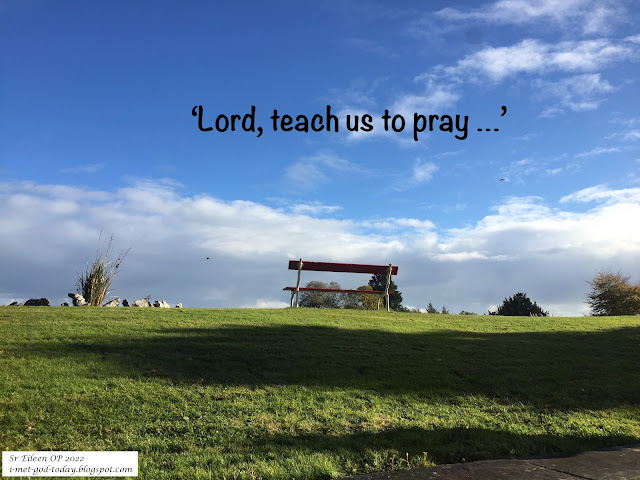Be careful what you pray for!
Seventeenth Sunday in Ordinary Time - Reflection on the readings
24 July 2022
‘Lord, teach us to pray, just as John taught his disciples.’
Be careful what you pray for!
This Sunday’s readings offer lessons on prayer. The Gospel passage opens with Jesus at prayer – a familiar scene in Luke – and with an intriguing request from the disciples: ‘Lord, teach us to pray.’ Why do they ask this? Presumably well-tutored already in those prayers recited in the synagogue and Temple, the disciples do not need to learn more. They speak of John and his disciples, but perhaps this is really about Jesus and them as His disciples. Do they hope to learn to become more like Jesus, to approach their God as Jesus does? Whatever their motivation, Jesus responds positively. The disciples do not learn specific words for reciting by rote. Instead, Jesus teaches them about relationship with God. He offers guidance on how to pray and what to pray for, on the importance of perseverance, and on the effectiveness of prayer.
In today’s first reading, Abraham demonstrates the effectiveness of persistence with God. The LORD has not spoken explicitly of destroying anyone yet Abraham, seemingly expecting this, aims to prevent it from happening in Sodom and Gomorrah. Reminding the LORD who God is, he repeatedly presses the LORD to spare the people: ‘Do not think of doing such a thing: to kill the just with the sinner, treating just and sinner alike. Do not think of it! Will the judge of the whole earth not administer justice?’ Ultimately, Abraham’s perseverance pays off and the people are unharmed.
What Jesus teaches the disciples is interesting in terms of how we might pray and how we might live as followers of Jesus today. Most Christians pray these words often, many at least once daily. What do they demand of us? Jesus begins with an invitation to recognise God as ‘Father’ and to form a personal relationship with God who is Father of all. To pray ‘may your name be held holy’ is to commit to living well, to doing nothing that detracts from what keeps God’s name holy. Our lives must be such that they point to God and in a wholesome manner. Praying ‘your kingdom come’ is also challenging. How do we discover God’s will? Having done so, how do we do work to bring about God’s kingdom? The kingdom we pray for does not mean an easy life and yet it is simple. It starts with relationship with God and asks everything of us, as it did of Jesus and, later, as it did of the disciples.
Only after God has been addressed is Jesus’ way of praying concerned with earthly realities. Asking that God ‘give us each day our daily bread’ recognises both that we can rely on, and trust in, God’s providential care and that we are not the master or mistress of our own destiny. Consequently, we have no need to worry about, or amass, those things that we need. To pray ‘forgive us our sins, for we ourselves forgive each one who is in debt to us’ is audacious. Without putting conditions of God’s forgiveness, Jesus’ words have us asserting boldly that forgiving our brothers and sisters is already our way of being. If it is not, it may give us pause in asking this of God until we amend our relationships with others. Praying ‘do not put us to the test’ looks to the eschaton. It is to trust that God will continue to aid us in remaining faithful when we meet with the difficult challenges expected in the end times.
Continuing with a parable, Jesus illustrates the need to keep on praying. Oftentimes, we can feel prayer is in vain. Experience teaches us that God does not always answer, at least not at once or not in the way we expect, and sometimes, it seems, not at all. Yet Jesus’ teaching offers hope, suggesting that God will in fact answer, that persistence will pay off, and that we must keep asking. While Jesus is emphatic that our asking, searching, and knocking ‘will’ meet with a response, repeating that this is ‘always’ so for all those who ask, search, or knock, it is important to note what follows. Jesus teaches the disciples that God knows to a greater extent than humans how to respond well. A child asking for food will not receive a stone, snake or scorpion. Parents do not meet a child’s request with something useless or dangerous. By the same token, if my nephew asks for something I know not to be for his good, I will say no. His wish is unanswered but that does not mean it is unheard or that he is not loved both in his asking and my refusing.
So it is with God. Jesus does not promise that God will grant us all that we ask. Rather, Jesus asserts that ‘the heavenly Father’ will ‘give the Holy Spirit to those who ask him!’ Perhaps these words offer some explanation, indeed reassurance, when our prayers seemingly go unanswered. It may be that we sought what was not for our good and that God’s answer, when it comes, will be. As today’s Psalm reminds us: ‘On the day I called, you answered me, O Lord.’
Encouraged by today’s readings, may we call on the Lord continually, confident that God our Father will answer. Similar to the adage, “Be careful what you wish for, you might just get it,” one might well caution, “Be careful what you pray for!” To pray in the manner that Jesus teaches will ask much of us and may cost us everything. May we persist in such prayer so that, through our lives, we might offer others a glimpse of God’s kingdom and of God’s love.
Throughout our lives, God gives us many opportunities to make God’s name holy and to strive for the coming of God’s kingdom. Let us seek for and seize these opportunities with both hands. Jesus teaches us to pray for this, and our world needs us to do so: to live as disciples who have been taught ‘how to pray’ in deed as much as in words.
Readings for 17th Sunday in OT:
Genesis 18:20-32; Psalm 138; Colossians 2:12-14; Luke 11:1-13
Genesis 18:20-32; Psalm 138; Colossians 2:12-14; Luke 11:1-13
also published on: www.dominicansisters.com/homily/seventeenth-sunday-in-ordinary-time-24-july-2022/



Comments
Post a Comment
Thank you for reading my writing. I'm interested to hear your thoughts - please share.